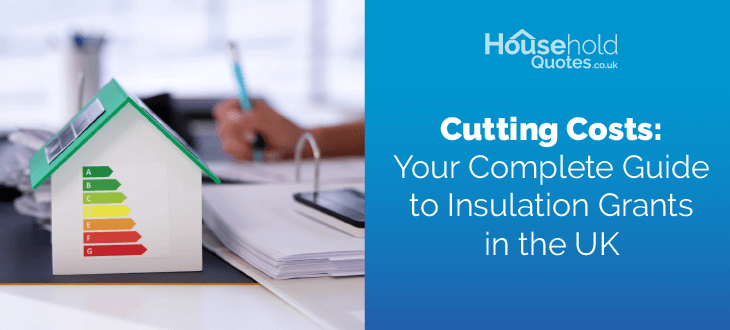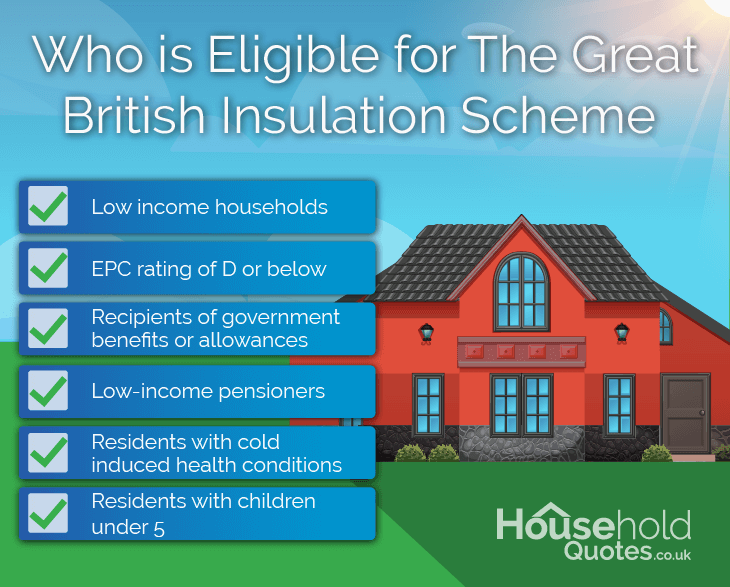
Tell us what you need to find a matching loft conversion specialist

Get free quotes from professionals near you

Compare offers and choose the one that best matches your need
- Householdquotes.co.uk
- Home Insulation
- Home Insulation Grants
Insulation Grants: A UK Guide

- Both grant schemes are currently active and will remain so until March 2026.
- Low-income earners, government benefit recipients, and owners of energy-inefficient homes may be eligible for free insulation grants.
- The UK currently has two main grant schemes: the Great British Insulation Scheme (GBIS) and the Energy Company Obligation (ECO4) Scheme.
Insulating your floors, walls, and loft can save you a substantial amount of money on energy bills, typically around £630 to £730 per year. Additionally, it can reduce your carbon footprint by 1.4 to 1.7 tonnes. However, the cost of insulation may not be affordable for everyone.
A 2022 study by the Resolution Foundation found that UK homes with poor insulation spend 58% more on gas for heating than those meeting government standards. To save energy, reducing heat loss in homes is crucial.
The UK government is investing £12 billion in Help to Heat schemes to make homes warmer and more affordable to heat. This guide will provide in-depth information on insulation grants in the UK, covering their advantages in reducing household expenses, eligibility criteria, application procedures, and more.
Are you planning to insulate your home? Let Household Quotes UK take care of all the tedious research and vetting for you. Instead of spending endless hours scouring websites and setting up appointments with installers, simply fill out our quick online form in just 30 seconds, and we'll provide you with up to three free quotes from professional installers in your local area. Click the button below to get started!
- Describe your needs
- Get free quotes
- Choose the best offer
It only takes 30 seconds



What is the Great British Insulation Scheme?
The Great British Insulation Scheme (GBIS) is a UK government plan to help people who struggle to pay for heating and lower carbon emissions. The scheme is managed by Ofgem, and provides insulation upgrades for homes after an assessment. The scheme has a budget of £1 billion until March 2026 and is in line with the UK's net-zero target.
Based on the most effective measure, GBIS offers one type of insulation measure per household. This is an important part of the UK's effort to fight climate change, as it helps to make homes more energy-efficient and reduces domestic greenhouse gas emissions.
GBIS's long-term commitment and significant budget show that the government is dedicated to improving energy efficiency in the UK. The scheme has a big impact on energy efficiency and carbon emissions in the country, which is a major step towards the UK's net-zero target.
How can your home benefit from receiving free insulation?
Insulating your home is an excellent investment that can offer a multitude of benefits. It not only increases the value of your property but also helps you save money on energy bills and reduces your domestic carbon footprint. By insulating your home, you can also improve your financial stability in the long run.
Here are a few of the key advantages that come with ensuring proper home insulation:
- Reduce your energy bills by up to £650 per year: This will significantly reduce heat loss during winter and heat gain during summer, resulting in savings of up to £650 annually.
- Take control of your energy usage: Draughty windows and doors can cause significant energy waste. Insulation can help seal these leaks, preventing precious heated or cooled air from escaping your home and keeping your money in your wallet.
- A long-term investment that pays off: The energy savings you'll enjoy will far exceed your initial investment, despite the upfront cost. Insulating your property will significantly reduce your energy consumption, saving you money on heating and cooling bills, and improving your property's energy efficiency.
When it comes to safeguarding your health, property, savings and the environment, home insulation is one of the most effective ways to achieve all of these goals with just one investment.
Who is eligible for free insulation from the Great British Insulation Scheme?

To be eligible for free insulation from the Great British Insulation Scheme, an applicant must meet specific qualification criteria. These criteria are designed to ensure the process is transparent and fair for all applicants.
Factors such as income, the Energy Performance Certificate (EPC) rating of your home, and whether you receive any government assistance are considered to determine if you require such assistance.
There are two ways to apply for free insulation from the Great British Insulation Scheme: as a homeowner or home renter. Although the qualification criteria are similar, there may be slight differences.
Low-income households
The Great British Insulation Scheme does not clearly define a low-income household. However, the Energy Company Obligation (ECO4) grant scheme offers specific criteria for determining low-income families in the UK.
Under the ECO4 criteria, a household's low-income status can be determined by their total gross income, which should be below £31,000 per year.
Another factor that comes into play is the council tax band range, which is used to calculate the property's value and the corresponding council tax. This range is an additional indicator of low-income status.
If a household is in council tax bands A to D in England or A to E in Scotland and Wales, they may be eligible for assistance through the Great British Insulation Scheme.
EPC rating of D or below
The Energy Performance Certificate (EPC) rating is a measure of your home's energy efficiency. It informs you about the amount of energy that your home consumes and the resulting environmental impact. EPC ratings range from A (most efficient) to G (least efficient).
For the Great British Insulation Scheme, the qualifying EPC rating range varies depending on whether you own or rent your home:
- Private home renters must have an EPC rating of D or E.
- Homeowners must have an EPC rating of D to G.
However, if you are a homeowner, your property's EPC rating is not the only important qualification. As mentioned earlier, you must also qualify for the correct council tax band ranges.
Households that receive at least one benefit
Individuals who receive UK government allowances and benefits, whether they are homeowners or tenants, may qualify for assistance from the Great British Insulation Scheme.
The following benefits are currently recognized as eligible:
- Income-based Job Seekers Allowance
- Income-related Employment and Support Allowance (ESA)
- Income Support
- Pension Credit
- Guarantee Credit
- Working Tax Credit
- Child Tax Credit
- Universal Credit
- Housing Benefit
It's important to note that pensioners and individuals over 70 can still get free loft insulation even if they don't meet the grant qualification criteria. Although age alone isn't a qualifying factor, pensioners can receive assistance if they belong to one of two groups: the low-income group or the general group.
Low-income group (top priority):
- Homeowners or private renters with an Energy Performance Certificate (EPC) rating of E or below (for renters) or D or below (for homeowners).
- Annual gross income below £31,000 and living in social housing. Age is considered if vulnerable to the cold.
- Means-tested benefit recipients, including Pension Credit Savings/Guarantee, are also eligible.
General group:
- Homeowners who fall under council tax band A-D (in England) or A-E (in Scotland & Wales) are eligible.
- Homeowners with a Home EPC rating of D or below are also eligible.
Additional considerations for pensioners (ECO4 scheme):
Flexible eligibility is available for pensioners who meet any of the following criteria:
- Low-income household.
- Medically diagnosed health condition worsened by the cold.
- Presence of a child under five or a resident over 65 in the household.
Contact your energy provider to understand the ECO4 scheme and confirm eligibility.
What do insulation grants get you?
The Great British Insulation Scheme (GBIS) offers insulation upgrades for qualifying homes. Energy providers assess homes to determine effective upgrades. Low- and mid-tier upgrades may be fully covered, while high-cost measures may require a household contribution. The scheme is tailored to your needs and circumstances.
- Cavity wall insulation grants
- Solid wall insulation grants (external and internal).
- Loft insulation grants
- Flat or pitched roof insulation grants
- Underfloor insulation grants
- Solid floor insulation grants
- Park home insulation grants
- Room-in-roof insulation grants
After you have been approved for grant assistance, your property will be inspected to determine the best action based on its particular needs. It's important to note that you must work with a professional accredited installer if you are receiving a grant. For example, if you are applying for loft insulation, you must work with professional loft insulation installers.
Other schemes that offer free insulation and insulation grants besides the Great British Insulation Scheme
Another nationwide home efficiency scheme available is the Energy Company Obligation (ECO4) Scheme, which is in addition to the Great British Insulation Scheme we mentioned earlier.
Both schemes complement each other, but in reality, the ECO4 is applied differently. Here are the main differences:
- Reach: The ECO4 scheme provides multiple energy efficiency measures to qualifying households, unlike the Great British Insulation Scheme, which focuses on a single insulation measure per household.
- Responsibility: Although both the Great British Insulation Scheme and the ECO4 scheme aim to improve energy efficiency, the ECO4 scheme places direct responsibility on energy providers, while the former is a responsibility enacted by the UK government.
- Compensation: The Great British Insulation Scheme is specifically designed to provide households that qualify with insulation upgrades. In contrast, the ECO4 scheme offers a range of energy-efficient home upgrades, including heating system maintenance, repairs and replacements, intelligent heating controls, and other related services.
It would help if you met specific eligibility criteria to apply for the ECO4 scheme or the Great British Insulation Scheme. To determine the best scheme for you, contact your energy provider directly. They will share more information about the process and eligibility criteria for the ECO4 scheme. You can apply for the GBIS through the UK government portal.
Bonus: The Warm Home Discount Scheme
The Warm Home Discount Scheme is a small-scale assistance program by the UK government that helps eligible households with their energy costs.
This scheme is available in England, Scotland, and Wales and offers a yearly grant of up to £150. The grant is applied directly to the household's electricity bill but can also be used as a discount on gas bills.
Contact your energy provider today to find out if you qualify for this service, which can help you save on your energy bills!
Are insulation grants still available?
The Great British Insulation Scheme (GBIS) and the Energy Company Obligation (ECO4) schemes are currently active until March 2026. Each qualifying household is eligible for a one-time grant.
In the UK, new schemes typically replace outgoing grant schemes to ensure continuous support. As a result, new schemes will be introduced beginning in 2026.
To stay up to date with available grant schemes and new ones, regularly checking the UK government portal for the latest news is recommended.
How can you apply for insulation grants?
To apply for The Great British Insulation Scheme, visit the UK government portal for information, including a qualification survey, housing assessment, and more.
The Great British Insulation Scheme (GBIS) and the Energy Company Obligation (ECO4) schemes are currently active until March 2026. Each qualifying household is eligible for a one-time grant.
To apply for the Energy Company Obligation (ECO4) Scheme, contact your energy supplier to learn more about the criteria and application process. Your energy company will complete the housing assessment and provide the grant.
Both schemes are presently operational and accepting applications until March 2026.
Did you know you can apply for a grant scheme through British Gas? The British Gas Energy Trust provides funding, advice and energy debt grants to over 2 million UK residents. Since its launch in 2014, the trust has donated over £200 million.
Deciding to get home insulation is just the beginning of the road. It's important to work with a professional installer to make sure the job is done right. However, finding the right installer can have you spend endless hours surfing the web and arranging phone calls, without a bargain in sight. That's where Household Quotes UK comes in!
By filling in our simple 30-second form, you can receive up to 3 free home-tailored quotes from our wide-spanning network of trusted installers. The best part? Our services are completely free of charge and come with no obligation to accept any quotes. Click below to begin!
- Describe your needs
- Get free quotes
- Choose the best offer
It only takes 30 seconds



FAQ
In the UK, certain requirements must be met to qualify for insulation grants. Generally, households with low incomes, properties with an Energy Performance Certificate (EPC) rating below D, and people receiving government benefits and allowances are considered to be the most suitable candidates for government grant schemes.
The Great British Insulation Scheme aims to improve the energy efficiency of fuel-poor homes with an EPC rating below D. Priority is given to homes with owners or tenants receiving government benefits and allowances.
If your home has an EPC rating below D and receives one or more government benefits, you may qualify for the Great British Insulation Scheme. British Gas offers free loft insulation for qualifying homes through this scheme. You can schedule a home assessment with British Gas on their official website to determine if you meet the eligibility criteria.
If you are over 70, you may be eligible for free loft insulation under the Great British Insulation Scheme (GBIS) or the Energy Company Obligation (ECO4). However, please note that age alone is not enough to qualify for insulation grants for pensioners. Your home’s Energy Performance Certificate (EPC) rating and whether you receive government assistance are also essential factors to consider.
An EPC rating measures how energy-efficient your property is, with grades ranging from A (most efficient) to G (least efficient). A rating below D is considered inefficient and may qualify for UK grant schemes. Ensure you have an EPC rating for your home, especially if you plan to buy, sell, or rent it.

Akif has a keen interest in green home improvement solutions and the role of digital media in identifying climate trends. He aims to provide a multidisciplinary approach to content rooted in credible research and accuracy.
